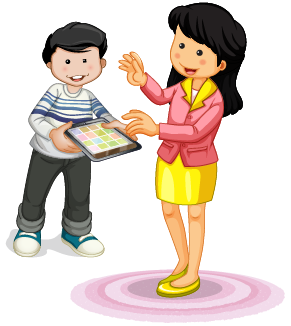Child's healthy media diet
In a study investigating online behaviours in 2017, it was found that 8-12-year-olds in Singapore spend an average of 35 hours in front of digital screens for entertainment alone, which was 3 hours more than the global average.
 48% of the children had their own personal mobile phones, and spent an average of about 6.5 hours a day. This number is quite alarming, given that it is about the same number of hours that they are in school. 48% of the children had their own personal mobile phones, and spent an average of about 6.5 hours a day. This number is quite alarming, given that it is about the same number of hours that they are in school.
Digital media itself is not dangerous for young people; however, its impact depends on when, how much, and to which content children are exposed to. Thus, as parents, it is important to set the boundaries and guidelines for your children as early as possible.

The American Academy of Paediatrics has made some evidence based recommendations for children's and adolescents media use.

Children younger than 18 to 24 months
- Avoid digital media use, except for video-chatting.
Children between 18 to 24 months
- Co-view and choose high-quality programming.
Children between 2 to 5 years of age
- Limit screen use to 1 hour per day of high-quality programming.
- Co-view with your children and help them apply what they learn to the world around them.
- Avoid fast-paced programs and apps with lots of violent or distracting content.
- Avoid using media as the only way to calm your child.
- Use apps together with your child and ask the child what he or she thinks about the app.
- Keep bedrooms, mealtimes, and parent–child playtimes screen free for children and parents.
- No screens 1 hour before bedtime and remove devices from bedrooms before bed.
School Age Children
- Discuss what media behaviors are appropriate for each child or teenager.
- Place consistent limits on hours per day of media use.
- Engage in selecting and co-viewing media together with your child so that they learn what are appropriate sources of media.
- Discourage entertainment media while doing homework.
- Designate media-free times together (eg, family dinner) and media-free locations (eg, bedrooms) in homes.
- Children should not sleep with any devices in their bedrooms - these include TVs, computers, and smartphones.
- Promote activities that are likely to facilitate development and health, including activities such as reading, teaching, talking, and playing together.
- Discuss issues regarding online safety such as avoiding cyberbullying and sexting, being wary of online solicitation, and avoiding communications that can compromise personal privacy and safety.
- Actively develop a network of trusted adults (eg, aunts, uncles, coaches, etc) who can engage with children through social media and to whom children can turn when they encounter challenges.
*Adapted from www.aap.org
|


